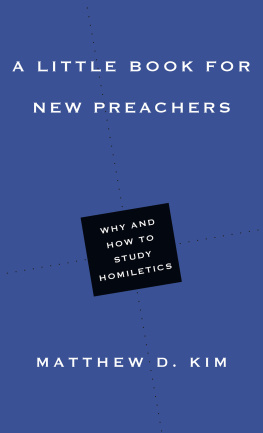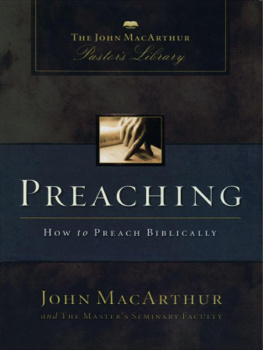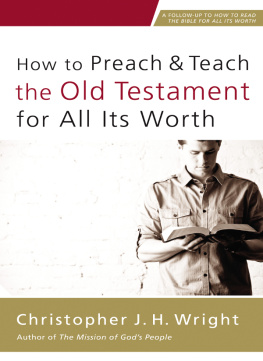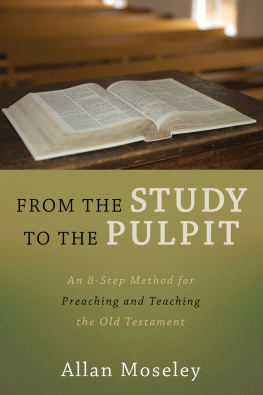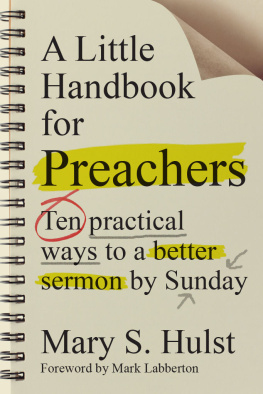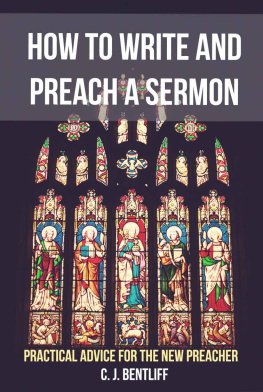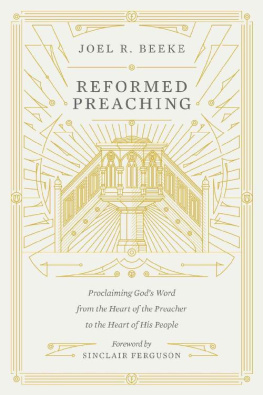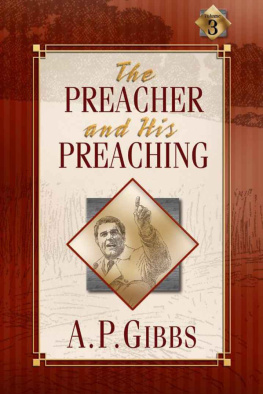THE HEART of the PREACHER
Preparing Your Soul to Proclaim the Word
Rick Reed


The Heart of the Preacher: Preparing Your Soul to Proclaim the Word
Copyright 2019 Rick Reed
Lexham Press, 1313 Commercial St., Bellingham, WA 98225
LexhamPress.com
All rights reserved. You may use brief quotations from this resource in presentations, articles, and books. For all other uses, please write Lexham Press for permission. Email us at .
Unless otherwise noted, Scripture quotations are from ESV Bible (The Holy Bible, English Standard Version), copyright 2001 by Crossway Bibles, a publishing ministry of Good News Publishers. Used by permission. All rights reserved.
Print ISBN 978-1-68-359348-5
Digital ISBN 978-1-68-359349-2
Lexham Editorial Team: Elliot Ritzema, Jennifer Edwards, Danielle Thevenaz
Cover Design: George Siler
To my preaching models and mentors:
Maynor Reed
Bill Lawrence
and Bill McRae
CONTENTS
by Bryan Chapell
M uch has been written about pastoral burnout in recent years, but this is not the first generation of pastors to look for the exit sign from spiritual leadership. When congregational challenges, personal attack, and inescapable fatigue dug into Moses heart, he also walked from the path God had designed for his ministry (Num 20:113).
Commenting on the Israelite leaders response, the psalmist says that Moses used rash words (Ps 106:33). In plain terms, Moses got mad, causing him to lash out at those who had hurt him and to dishonor the God who had helped him.
How did it happen? Moses had been faithful for so many decades. He had been brave when others ran. He had relied on God when others turned to idols. He had followed the cloud and fire of Gods direction when others wanted to go back to Egypt. Moses had led well for more than forty years by providing Gods instruction for behavior, belief, and the nations direction. Why, then, did he falter so late in the journey toward the promised land?
THE MOSES FACTOR
We wont get to the answer if we suggest the reason is the same as researchers gave for pastoral burnout a decade ago. At that time, roughly thirty percent of all North American seminary graduates were leaving pastorates within the first five years of ministry.
Researchers initially concluded that the reason for the high rate of burnout was pervasive pastoral fatigue. Pastors were being expected to work long hours to serve declining congregations with diminishing finances, weakening denominational commitments, lower biblical literacy, and smaller staffs. The pressures were obviously creating unbearable workloads for each pastor who had intended to serve God through a life of meditation within a sedate congregation at the little brown church in the dell.
While it made good sense that increasing demands on pastors families, finances, and energies were responsible for so many pastors leaving ministry, further research failed to confirm that conclusion. While there certainly were pastors who expected ministry to be sweet, few believed it would be easy. Most entered the pastoral vocation with good energy, strong commitments, and few illusions about finding a church with a white picket fence that kept out all difficult problems and people.
Fatigue was certainly a factor in pastoral burnout, but there was more to consider. More study revealed that workloads were not as damaging as heartloads. The Moses factor that more and more preachers were facing was heavy workloads combined with a sense of being unappreciated for bearing them. It is one thing to feel the weight of the burdens of ministry, but quite another to be blamed for the burdens.
In Moses case, he not only tires of a wilderness journey that had lasted almost half a century, he faces a congregation in rebellionagain. Adding to his weariness are people who do not merely complain, they blame. They quarrel with Moses and hound him with accusatory questions: Why have you brought the assembly of the L ORD into this wilderness, that we should die here, both we and our cattle? and, And why have you made us come up out of Egypt to bring us to this evil place? The people attack the very leader who has sacrificed everything to save them. Their lack of support for him does more to exhaust his zeal for ministry than forty years of desert wandering.
ITS NOT JUST FATIGUE THAT LEADS TO FAILURE
Good research over the last decade has disclosed that such factors are still at work in modern ministry. At the same time that pastors workloads have been increasing, they are easy-target explanations for the diminishing congregations, finances, and loyalties. Local preachers are increasingly compared to the master communicators on radio and the internet. As lessening denominational loyalties lead to increased church shopping and hopping, ministers are too often judged for their effectiveness rather than their faithfulness. As pastoral respect diminishes throughout the culture for a variety of reasons, pastors and their families experience increased scrutiny and insecurity. Ministry seems increasingly dangerous, and ministers feel increasingly unappreciated.
These pressures with other contributing factors can lead many preachers to feel the pain expressed by a pastor friend of mine when he says, I feel guilty when I sit down. Such intractable pressure (real or perceived) does not merely result in fatigue but in resentment that feeds a brooding anger that is far more debilitating that tiredness alone.
Fatigue, though it can destroy, more often only drains our stamina and sets up the heart for the Moses factor that is defined by a combination of tiredness and anger. Tiredness is not usually a sufficient cause for preachers to conclude that they must leave ministry but, if you combine fatigue with anger, then energy for, and commitment to, pastoral tasks and sacrifices drain quickly. We can shoulder extremely heavy loads imposed by others until our hearts begin to whisper, How dare they?
We will sacrifice for others with incredible stamina and selflessness until we begin to wonder why others do not sacrifice for us. We can minister much to others out of appreciation for Christ until we find ourselves thinking more about how much others do not appreciate us.
PASSING THE HEART TEST
No one will be able to take from the shoulders of responsible pastors the heavy loads of ministry. But Rick Reed writes from pastoral experience and leadership to help us understand what will test the pastoral heart and what God provides to strengthen it. Pastors who are willing to look clearly and unflinchingly into the challenges for continued ministry that reside in their own hearts will find The Heart of the Preacher invaluable and re-invigorating for ministry.
We need such a book because feeling isolated, overworked, and unappreciated in ministry at the same time we are fearing failure, embarrassment, and conflict is the Moses factor that is not confined to ancient history. Even as I write these words, I become aware that these warnings and observations from me are, more frequently than I wish, needed by me.
I know the pain of personal attack, the pressure to succeed, and the disappointment of not meeting others expectations. I know how bitterness can grow in me when complaints about me multiply in others. I know that, in order to continue to minister, I need the counsel of a man of God like Rick Reed who loves the ministry, loves Gods people, and loves the Savior. In




